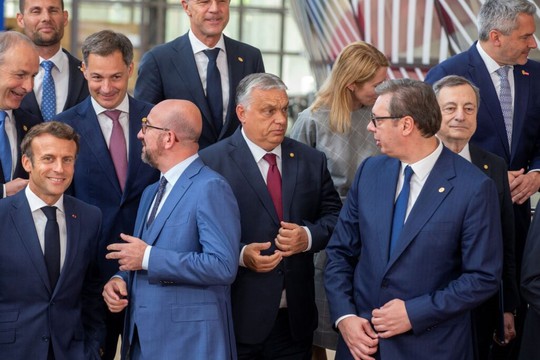Hungarian PM Viktor Orbán, center, during a summit in Brussels.
Photo: AFP
Hungarian Prime Minister Viktor Orbán regularly pushes the EU to the cliff edge, but diplomats are panicking that his hostility to Ukraine is now about to finally kick the bloc over the precipice, writes POLITICO.
A brewing political crisis is set to boil over at a summit in mid-December when EU leaders are due to make a historic decision on bringing Ukraine into the 27-nation club and seal a key budget deal to throw a €50 billion lifeline to Kyiv’s flailing war economy. The meeting is supposed to signal to the U.S. that, despite the political distraction over the war in the Middle East, the EU is fully committed to Ukraine.
Those hopes look likely to be knocked off course by Orbán, a strongman who cultivates close ties with Vladimir Putin and who is widely seen as having undermined democracy and rule of law at home. He is demanding the whole political and financial process should be put on ice until leaders agree to a wholesale review of EU support for Kyiv.
That gives EU leaders a massive headache. Although Hungary only represents 2 percent of the EU population, Orbán can hold the bloc hostage as it is supposed to act unanimously on big strategic decisions — and they hardly come bigger than initiating accession talks with Ukraine.
It’s far from the first time Orbán is throwing a spanner in the works of the EU’s ‘sausage making machine’. Indeed, he has been the most vocal opponent of sanctions against Russia. But this time is different, EU diplomats and officials said.
“We are heading toward a major crisis,” one EU official said, who was granted anonymity to discuss confidential deliberations. One senior EU diplomat warned this could become “one of the most difficult European Councils.”
In theory, there is a nuclear option on the table — one that would cut Hungary out of EU political decisions — but countries feel that emergency cord is toxic because of the precedent it would deliver on EU disunity and fragmentation. For now, the European leaders seem to be taking to their usual approach of fawning courtship of the EU’s bad boy to try to coax out a compromise.
As frustration grows, the EU is weighing how to deal with the Hungarian threats.
In theory, Brussels could come out with the big guns and use the EU’s so-called Article 7 procedure against Hungary, used when a country is considered at risk of breaching the bloc’s core values. The procedure is sometimes called the EU’s “nuclear option” as it provides for the most serious political sanction the bloc can impose on a member country — the suspension of the right to vote on EU decisions.
Because of those far-reaching consequences, there is reticence to roll out this option against Hungary. When EU leaders brought in “diplomatic sanctions” against Austria in 2000, the day after the party of Austrian far-right leader Jörg Haider entered the coalition, it backfired. Many Austrians were angry at EU interference and anti-EU sentiment soared. Sanctions were lifted later that year.
There is now a widespread feeling in Brussels that Article 7 could create a similar backlash in Budapest, fueling populism and in the longer term potentially even trigger a snowball effect leading to an unintended Hungarian exit of the bloc.
Given those fears, diplomats are doubling down on ways to work around a Hungarian veto.
The same dilemma goes for the EU’s planned military aid. EU countries could use bilateral deals rather than EU structures such as the European Peace Facility to send military aid to Ukraine — effectively freezing out Budapest. Yet this would mean that the EU as such plays no role in providing weapons, an admission of impotence that is hard to swallow and hurts EU unity toward Kyiv.
It’s “obvious” that concern is growing about EU political support for Ukraine, Lithuania’s Foreign Minister Gabrielius Landsbergis told POLITICO. “At first it’s Hungary, now, more countries are doubtful whether there’s a path.”
That leaves one other default option, and it’s an EU classic: kicking the can down the road and pushing key decisions on Ukraine policy to early next year.
There is a constant stream of attacks coming from Budapest against Brussels, on issues ranging from democratic deficit to culture wars over the EU’s migration policy. The latest example is an aggressive euroskeptic advertising campaign featuring posters targeting European Commission President Ursula von der Leyen herself. The posters show von der Leyen next to Alexander Soros, the son of George Soros, chair of the Open Society Foundations, with the line: “Let’s not dance to the tune they whistle!”
Hungary’s prime minister was quick to congratulate the winner of the Dutch election, the vehemently anti-EU Geert Wilders, saying that “the winds of change are here.”
“Orbán plays the long game,” an EU official said. “With Wilders, one or two more far-right leaders in Europe and a potential return of Trump he could soon be less isolated than we all think.”
read more in our Telegram-channel https://t.me/The_International_Affairs

 10:02 02.12.2023 •
10:02 02.12.2023 •























